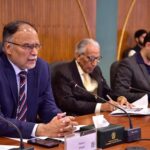ISLAMABAD, Feb 15 (APP): Various civil society organizations have appreciated the government’s decision to increase taxes on cigarettes, terming it the most effective way to reduce tobacco consumption in the country.
According to their representatives, the approval of SRO by the government in this regard aimed to increase excise tax on cigarettes is a highly commendable move and the Federal Board of Revenue (FBR) has taken a historic step to protect public health.
They said that the move will further strengthen sustainable economic growth. However, they said that still there is great room available to increase further taxes on cigarettes, helping a great deal in reducing the affordability of cigarettes, especially among youth.
The demand for tobacco is strongly influenced by its price. Taxation is the most cost-effective way of reducing tobacco consumption, especially among young people and those with low income.
Price increases encourage people to stop smoking, prevent others from starting smoking, and discourage ex-smokers from starting smoking again, they added.
Studies have shown that the effect of taxation is more pronounced in developing countries. A price rise of 10% decreases consumption by four percent in developed countries and by up to eight percent in developing countries.
There is considerable scope to increase tobacco prices through taxation as in many countries cigarette prices have not kept up with increases in the price of other goods and services.
Studies have also predicted that cigarette price increases of 33% would prevent 22-65 million smoking-related deaths worldwide or 5-15% of all such deaths. An increase of 70% would save 46-114 million smoking-related deaths, or 10-26% and most would be among young men in developing countries.
The tobacco industry’s argument that tobacco taxes are unfair to poor people ignores an important fact as, on average, poor people are also more price sensitive than rich people. They are therefore more likely to stop smoking or reduce consumption when faced with a tobacco tax increase.
Apart from the health benefits, there is evidence that, in the longer term, tobacco tax increases actually shift the tax burden from the poor to the rich. They thereby increase the income available for other types of spending.
Project Coordinator, Coalition for Tobacco Control Pakistan CTC-Pak Zeeshan Danish urged the government to further increase taxes on tobacco.
He said that taxes on tobacco in Pakistan is the lowest as compared to the region. It will not only discourage new smokers but will also decrease the overall consumption of tobacco among all factions, he added.
He said that the National Tobacco Control Strategy (NTCS) must be implemented in letter and spirit which will strengthen tobacco control efforts in the country.






